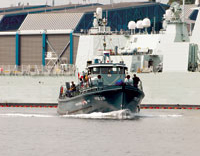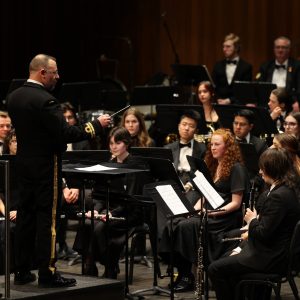
The Blue Boat cross-harbour ferry service will cease operations as of April 30, 2012.
The Blue Boats have satisfied many requirements to transport military members and DND civilian employees across Esquimalt Harbour over the past 50 years. Come the end of April, the venerable vessels will start a new chapter when their most recent role as scheduled shuttles will end.
The Auxiliary Fleet responsible for the boats’ operations is currently facing staffing challenges. The section is comprised of qualified ship’s officers, ship’s engineers and Deckhands that operate a range of vessels using a manning pool concept. As personal resources have become more constrained, it has become increasingly challenging for the Auxiliary Fleet to meet all of its operational commitments in addition to providing the cross-harbour service. By the end of April, given scheduling, leave, medical and all the other demands placed on personnel, it simply was not going to be acceptable to continue with the cross-harbour service while not having critically important Tugs and Barges available for operational support.
The primary task for the Blue Boats has been to connect Defence properties and organizations along the harbour in order to facilitate the performance of official duties. In recent years, an increasing number of people living in Colwood and the West Shore have availed themselves of the service to shorten or improve their travel to and from work. This was not a mandate of the Blue Boats but was perceived as such given the number of people who took advantage of this extra-capacity during commuting hours. Capt(N) Craig Baines, Base Commander of CFB Esquimalt, says while he is certainly sympathetic that the change will impact the 300 to 400 daily commuters that catch the Blue Boat each day, the Auxiliary Fleet have nevertheless exhausted their ability to both manage higher priority operational support requirements and continue the cross-harbour service.
“I understand very well that people took advantage of the excess capacity that existed within the shuttle service to help them with their commute,” said Capt(N) Baines. “Because the boats had the ability to accommodate that, it wasn’t an issue for us even though it was not part of our mandate. While not necessarily convenient, we can find other ways of getting around the harbour for work purposes. We can’t find other affordable ways to replace the incredible operational support the crews provide through use of tugs, barges and other essential pieces of equipment.”
“No question that we’re sensitive to the fact that this will change some folks daily commute, but as responsible resource managers, we have to ensure we’re putting our resources to our highest priorities,” he says. “Our number one priority is operational support to the Fleet and we’re now in a place where we need to realign our Auxiliary Fleet personnel resources to ensure that this support continues with a minimum of disruption.”
Scheduling, various types of leave, retirement, medical and other forms of attrition are amongst the personnel management challenges faced by the Auxiliary Fleet that underscore the now critical need to prioritize support to the Navy’s ships and submarines.
The core capabilities of the Auxiliary Fleet include crewing various tugs to manage ships’ movements and position specialty barges for jobs around the harbour and up in Nanoose. As well, a range of vessels are operated to conduct fuelling operations, mooring operations, bilge services and environmental responses.
With the Blue Boats ceasing their cross-harbour runs, there is an obvious potential for more vehicles to be added to the already congested commute from the western communities. This is clearly an unfortunate byproduct of having to take this decision. However, while Capt(N) Baines recognizes that this will not make the Base popular in the local community necessarily, it does further highlight the regional traffic issues to which everyone contributes and one for which a collective and collaborative solution is required.
“We understand the traffic situation is at times difficult and there is no question ceasing the shuttle service will, indirectly, add to the complexity of that,” he says. “But we also recognize that transportation is a regional issue that needs to be addressed through all the area stakeholders and we’re actively engaging those groups.”
In particular, Capt(N) Baines says the Base is in discussion with B.C.
Transit with a goal of exploring ways to mediate the impact on commuters affected by both this cessation and the existing traffic situation.
“While we can’t put resources towards helping people with the commute to work, we are very interested in working with these stakeholders in trying to develop solutions to make the regional transportation issue better. For instance, perhaps there is a private enterprise solution to this service that no one has thought of yet.”
The Blue Boats were built in 1955 by Star Shipyards in New Westminster, BC.
The Blue Boat cross-harbour shuttle service will cease no later than Apr. 30. The boats themselves will be maintained and used on an “as required” basis for operational purposes.












